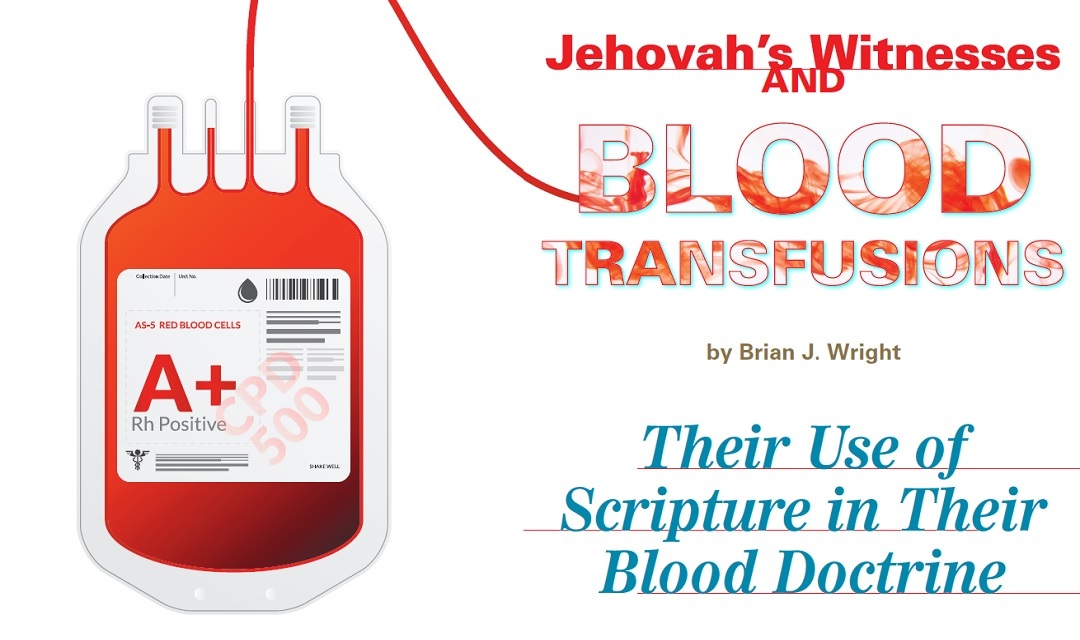This article first appeared in the CHRISTIAN RESEARCH JOURNAL, volume 37, number 05 (2014). The full text of this article in PDF format can be obtained by clicking here. For further information or to subscribe to the CHRISTIAN RESEARCH JOURNAL, click here.
Jehovah’s Witnesses (JWs) believe their Bible forbids them from accepting blood transfusions.1 By blood transfusions, they mean whole blood, red blood cells, white blood cells, plasma, or platelets. If any JW accepts one of these procedures, he will be excommunicated from his community and jeopardize his eternal life.2 So what does this have to do with everyone else?
Their blood doctrine doesn’t just affect them. Lawyers, doctors, next of kin, and children—to name just a few—continually have to deal with the implications of their religious position. Do they have the right to refuse blood transfusions for their minor children? Can someone else in their family or community authorize the procedure on their behalf if they are unable? What should we do about the misrepresentation of medical facts by their Governing Body in New York City?
These types of questions are part of the reason why lawyers, such as Kerry Louderback-Wood,3 and doctors, such as Osama Muramoto,4 have published their perceptive concerns. Yet regardless of the medical, ethical, social, or legal ramifications, what matters the most to JWs are the theological ones.
UNDERSTANDING THEIR POSITION
In 1945, the JW blood doctrine became official, making it a nonnegotiable tenet that could even prevent a JW from living eternally in God’s Kingdom.5 In 1958, the Governing Body decided to modify one aspect of their stance and allow an individual to receive certain antibodies (such as tetanus) if they so decided.6 In 1961, they introduced a new disciplinary measure, called “disfellowshipping,” for those who accept blood transfusion.7 Therefore, in addition to the heavenly consequence of separation from God, there is now the earthly consequence of removing the offender from fellowship in his community. Within the next three years, they expanded their doctrine and tweaked it again. The expansion extended the doctrine to pets, meaning that domesticated animals are no longer allowed to obtain transfusions.8 At the same time, they added another exception for people: they allowed vaccinations and inoculations.9 These additional changes permitted their children to attend public schools and JWs to travel as missionaries to other countries.
More Changes
Over the next few decades, JWs went back and forth, making provisions and then reversing their decisions. One prime example was in 1975. On February 25, the Governing Body decided to ban JWs with hemophilia from receiving any clotting factors such as Factor VIII.10 Only four months later, on June 11, they retracted the change and allowed the procedures again—eventually publicizing their reversal in print, albeit three years later.11 The main point here, however, is that some allowances are still in effect today, while others are currently forbidden.
On top of all this, it is also important to underscore the fact that only the Governing Body—currently composed of eight men—is authorized to “dispense spiritual food.”12 That means JWs must adhere to what these men interpret and publish regarding JW faith and practice.13 This is the main reason why JWs are not allowed to read articles such as this one, and why they state that if anyone tries to convince a JW to accept blood, then he or she is doing the work of Satan.14 One JW even stated in a letter, “I would equate a forced blood transfusion with rape.”15 And in 1994, one of their publications featured five children who died after refusing to take blood transfusions.16 They were hailed as martyrs because they put God’s decree first in their lives—or at least the Governing Body’s interpretation of it.
Theology
In order to support their theological interpretation, the Governing Body addresses their blood doctrine most explicitly and thoroughly in three publications.17 In these publications, they focus on three primary texts: Genesis 9, Leviticus 17, and Acts 15. All these texts specifically command people not to eat blood. JWs also often cite three other passages to support their view: Leviticus 7, Deuteronomy 12, and 1 Samuel 14. These texts also refer to eating blood, and God’s disapproval of it. Taken as a whole, they argue three main things in support of their position: (1) transfusing blood is equivalent to eating it—especially since food can be taken intravenously, (2) the Bible anticipated this modern topic and addresses it in principle—even though the Bible was not written with modern medical terminology, and (3) passages applicable to human blood are just as applicable to animal blood, since it is all sacred.
Granted, not all professing JWs agree with this blood doctrine—even though they are not recognized or accepted by the Governing Body or the worldwide JW community. For example, the Associated Jehovah’s Witnesses for Reform on Blood (AJWRB) are an outspoken group of JWs. They state that their efforts to reform the doctrine should be viewed as “loyal opposition” and they “do not seek the destruction of the organization, but simply want to see an end to this tragic and misguided policy.”18 Of course, they all remain anonymous because any JW member who challenges the organization’s interpretations or policies is not welcome in the community.
Now that we’ve surveyed their position, let’s evaluate it by noting some positives and negatives.
SCRIPTURAL, MEDICAL CONCERNS
The Bible still speaks to real people in real situations. This issue is another example. We may applaud JWs, then, for attempting to find answers to our modern questions in Scripture because it has them.
They are right to note that blood transfusions carry risks (like higher incidences of postoperative infections). They are right when they say the procedure is no guarantee that the person will live. They are also right in sharing that more doctors and hospitals are attempting to find bloodless alternatives for many procedures.
INVALID INTERPRETATION
As a Christian pastor, my first response is to “weep with those who weep” (Rom. 12:15). Countless preventable deaths have occurred because of the JW blood doctrine; and numerous children, adults, and extended families have lost and grieved for those they dearly loved. I’d like to extend my deepest condolences for these negative consequences. Christ has taken all these tragic events down with Him into the grave, and He has risen victoriously. Some day, every tear will be wiped away, and there will be no more death or mourning for those who would just look to Him (Rev. 21:4).
As a Christian historian and theologian, though, my first response is directed to their claim for refusing blood transfusions based on biblical grounds. I’m not denying that there is room for certain valid interpretive differences. Christian scholars do at times differ over the best interpretation of these texts. For instance, let’s take Acts 15—one of the main texts used to support the JW blood doctrine. Some scholars suggest that the command to abstain from blood was given because blood was tied to idolatry. Others link blood to murder. Others connect abstaining from blood with table fellowship. Others associate it with certain priests tasting the blood of the sacrifices. Still others combine blood with the prior word “strangled” and view them synonymously. Others attach it to missionary concerns. Still others argue that the best approach may not be to merely pick one above another, but rather to see several of them working in tandem.
So my initial response is not about the rejection of another valid interpretation. It is the rejection of a completely invalid interpretation. The JW blood doctrine finds no legitimate hermeneutical basis. For example, their arguments go beyond mere literalism, revealing more about the Governing Body’s organizational policy and predetermined commitments than anything about biblical teaching. If we view the scriptural prohibitions literally, they refer to animal blood—not human blood—and therefore have nothing to do with human blood transfusions. Searching more broadly across the scriptural landscape, we come to the same dead end. No scriptural passage commands refusing blood transfusions. No scriptural context implies refusing blood transfusions. No scriptural terminology forecasts refusing blood transfusions.
At the same time, God has given us a mind. By using our minds collectively, we have alleviated some of the sufferings in this world with modern medicine. This doesn’t negate that healing ultimately comes from God, but that He has given us both the intelligence and ability to invent and cultivate newer technologies, meaning there is no conflict between legitimate medical treatments and the Bible—especially since wisdom is a biblical category. JWs misappropriate the prohibition of eating animal blood by wrongly applying it to human blood transfusions. This issue reveals another profound difference between the way Christians approach their Bible and how JWs approach their Bible.
Yet even if we simply agree to disagree over the best interpretation of these passages, I would have one final question (and plea) to offer the Governing Body. How can you justify your emphasis on the sacredness of blood and the life it symbolizes, while at the same time denying for some the very life it symbolizes? In other words, your blood doctrine as it currently stands places more importance on the symbol than it does on what it symbolizes—life.
Pray for JWs. Their interpretations change all the time, so there is always hope this one will, too. But don’t just pray they can receive blood transfusions. Pray they will truly receive the blood of Christ, our God and Savior (Titus 2:13); and receive a blood transfusion if they need one, all the while placing their trust in God.
Brian J. Wright is a PhD candidate in New Testament and Christian Origins at Ridley Melbourne Missions and Ministry College, Melbourne, Australia.
NOTES
- I say “their” Bible here because they have produced their own translation of the Bible—the New World Translation—that is at times radically different from any other English translation of the Christian Bible in history (e.g., see John 1:1 or Colossians 1:16). This is important to highlight because it’s not always just a matter of Christians disagreeing with JW interpretation of the same wording.
- This does not mean they refuse all medical attention. In fact, they desire the best possible medical care, as long as it is bloodless.
- Kerry Louderback-Wood, “Jehovah’s Witnesses, Blood Transfusions, and the Tort of Misrepresentation,” in Journal of Church and State 47, 4 (2005): 783–822.
- Osama Muramoto, “Bioethics of the Refusal of Blood by Jehovah’s Witnesses: Part 1, Should Bioethical Deliberation Consider Dissidents’ Views,’” in Journal of Medical Ethics 24, 4 (1998): 223–30; “Bioethics of the Refusal of Blood by Jehovah’s Witnesses: Part 2, A Novel Approach Based on Rational Non-Interventional Paternalism,” in Journal of Medical Ethics 24, 5 (1998): 295–301; “Jehovah’s Witnesses and Blood Transfusions,” in The Lancet (1998): 352, 824; “Medical Ethics in the Treatment of Jehovah’s Witnesses,” in Archives of Internal Medicine 158, 10 (1998): 1155–56; “Bioethics of the Refusal of Blood by Jehovah’s Witnesses: Part 3, A Proposal for a Don’t-Ask-Don’t-Tell Policy,” in Journal of Medical Ethics 25, 6 (1999): 463–68; “Recent Developments in Medical Care of Jehovah’s Witnesses,’” in The Western Journal of Medicine 170, 5 (1999): 297–301. Even though these sources are slightly dated, and more medical advances have already taken place, they still represent several solid medical arguments against the JW position and remain some of the classic ones levied against their position.
- The Watchtower, July 1, 1945, 198–201. Cf. The Watchtower, October 22, 1948, 12.
- The Watchtower, September 15, 1958, 575.
- The Watchtower, January 15, 1961, 63.
- The Watchtower, February 15, 1964, 127–28.
- The Watchtower, November 1, 1961, 670 and November 15, 1964, 682, respectively.
- Awake! February 22, 1975, 30.
- The Watchtower, June 15, 1978, 29–31.
- The eight men are Gerrit Lösch, Geoffrey Jackson, Samuel Herd, Guy Pierce, Mark Sanderson, David Splane, Anthony Morris III, and Stephen Lett.
- The Watchtower, July 15, 2013, and God’s Kingdom Rules! (2014): 30–59, 130.
- The Watchtower, December 1, 1989, 12.
- Dena S. Davis, “Does ‘No’ Mean ‘Yes’? The Continuing Problem of Jehovah’s Witnesses and Refusal of Blood Products,” in Second Opinion 19, 3 (1994): 34.
- Awake! May 22, 1994.
- Blood, Medicine and the Law of God (New York: Watchtower Bible and Tract Society of Pennsylvania, 1961); Jehovah’s Witnesses and the Question of Blood (New York: Watchtower Bible and Tract Society of Pennsylvania, 1977), and How Can Blood Save Your Life? (New York: Watchtower Bible and Tract Society of Pennsylvania, 1990).
- For more details, check out their official website at http://ajwrb.org/.









